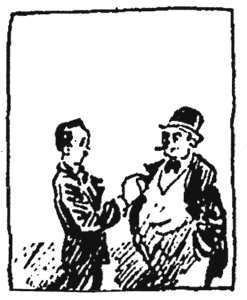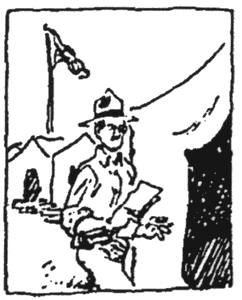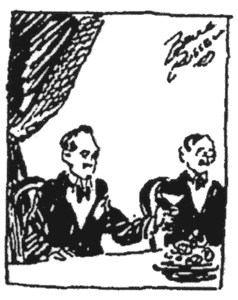[Newspaper]
Publication: The Los Angeles Times
Los Angeles, CA, United States
p. 4
 |
ROBERT HEMINGRAY, 317 South Olive street, believes he is the last of the wine agents.
 |
No, this doesn't mean that Hemingray is selling wine now. Or that he ever sold it. He never took an order in his life and would have raised his eyebrows at anyone who dared to try to give him one. His was one of those lordly and spacious occupations which brought him in friendly touch with political bosses, famous sportsmen and men and women who made the Great White Way bright, one of the group which included Harry Lehr, famous society playboy; Hector McKenzie, later partner of Jim Jerfries; Ned Greenway, member of the Family Club and the Bohemian Grove Club of San Francisco; Sport Donnelly, end on the Princeton football team, and Morton Smith, who was almost as prominent socially in Chicago as Harry Lehr was in New York and Philadelphia.
Which shows, doesn't it, how times have changed?
 |
Genteel Profession of "Good Old Days"
It probably was because of his family and social connections that Hemingray got his job, a job which started a young man without business training out with a salary of $10,000 a year, plus a huge expense account, and permitted him to work up to such affluence that he owned a string of horses which raced from coast to coast. He was a Kentuckian whose family tree connected him with the families of one President of the United States, numerous famous statesmen and a number of illustrious generals. He is a Son of the American Revolutlon and his mother once was regent of the D.A.R. He left the Virginia Military Institute to enter the war with Spain before he was 20, enlisting under an assumed name to escape interference from his family, which controlled a huge industrial enterprise, and rose so rapidly that during the American occupation of Cuba he was for a time virtual ruler of Culebra Island and later was provisional alcaide of a Cuban town until it could elect its own officers under American supervision. But when he returned to the United States his father was incapacitated and the uncles who controlled the business thought of him only as a boy just out of school. There was a family quarrel, and Hemingray hasn't communicated with his uncles since. That was how he became a wine agent instead of an industrialist.
 |
Starting in a Small Way
"I had to start at the bottom and work up," Hemingray says. "I only got $10,000 a year at first, but in a few years I was on friendly terms with most of the yachtsmen, turfmen and theatrical people of this country. My job was to travel from coast to coast, giving parties, parties, parties at which the brand of champagne I represented flowed freely. I still receive letters from members of the United States Senate who were friends in those days. I was at home in the sporting circles of New York, Chicago, St. Louis, New Orleans, San Francisco. I raced my horses over all the big racing circuits. It was first-page news in those days when a prominent wine agent came to town. I have given parties which many famous persons attended. I have loaned them money and have been a welcome guest in their homes. But, like most of the wine agents, I came out of the game with very little. And it was a hard life. I doubt that a single one of the other wine agents I knew is still alive."
·
·